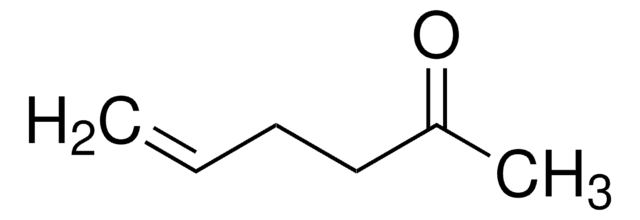103004
2-Hexanone
reagent grade, 98%
Synonym(s):
Butyl methyl ketone
Sign Into View Organizational & Contract Pricing
All Photos(3)
About This Item
Linear Formula:
CH3(CH2)3COCH3
CAS Number:
Molecular Weight:
100.16
Beilstein:
1737676
EC Number:
MDL number:
UNSPSC Code:
12352115
PubChem Substance ID:
NACRES:
NA.21
grade:
reagent grade
Assay:
98%
bp:
127 °C (lit.)
vapor pressure:
10 mmHg ( 39 °C)
Recommended Products
grade
reagent grade
Quality Level
vapor pressure
10 mmHg ( 39 °C)
Assay
98%
form
liquid
refractive index
n20/D 1.401 (lit.)
bp
127 °C (lit.)
mp
−57 °C (lit.)
density
0.812 g/mL at 25 °C (lit.)
SMILES string
CCCCC(C)=O
InChI
1S/C6H12O/c1-3-4-5-6(2)7/h3-5H2,1-2H3
InChI key
QQZOPKMRPOGIEB-UHFFFAOYSA-N
Looking for similar products? Visit Product Comparison Guide
Related Categories
General description
2-Hexanone can also be synthesized via Wacker oxidation of 1-hexene. It can be used as a solvent in paints, oils and waxes.
Application
Inhalation is suspected of causing peripheral neuropathy.
Signal Word
Danger
Hazard Statements
Precautionary Statements
Hazard Classifications
Flam. Liq. 3 - Repr. 2 - STOT RE 1 - STOT SE 3
Target Organs
Central nervous system
Storage Class Code
3 - Flammable liquids
WGK
WGK 1
Flash Point(F)
73.4 °F - closed cup
Flash Point(C)
23 °C - closed cup
Choose from one of the most recent versions:
Already Own This Product?
Find documentation for the products that you have recently purchased in the Document Library.
Customers Also Viewed
Dikshith.S.S.T
Handbook of Chemicals and Safety (2016)
"Wacker oxidation of 1-hexene in 1-n-butyl-3-methylimidazolium hexafluorophosphate ([bmim][PF6]), supercritical (SC) CO2, and SC CO2/[bmim][PF6] mixed solvent"
Hou Z, et al.
New. J. Chem., 26(09), 1246-1248 (2002)
Peripheral neuropathy associated with inhalation of methyl-n-butyl ketone.
S Duckett et al.
Experientia, 30(11), 1283-1284 (1974-11-15)
David J S Patinha et al.
Polymers, 12(9) (2020-08-28)
In this contribution, thin poly(ionic liquid) (PIL) coatings with a well-defined pore structure built up from interpolyelectrolyte complexation between a PIL and poly(acrylic acid) (PAA) were successfully used for enhanced solid phase microextraction (SPME). The introduction of porosity with tunable
J W Griffin
Neurobehavioral toxicology and teratology, 3(4), 437-444 (1981-01-01)
The neurotoxicity of hexacarbon solvents has become apparent only recently, but an extensive literature has already developed as a result of the clinical and epidemiological implications of the human disease, and the advantages of small animal models of hexacarbon neurotoxicity
Our team of scientists has experience in all areas of research including Life Science, Material Science, Chemical Synthesis, Chromatography, Analytical and many others.
Contact Technical Service












